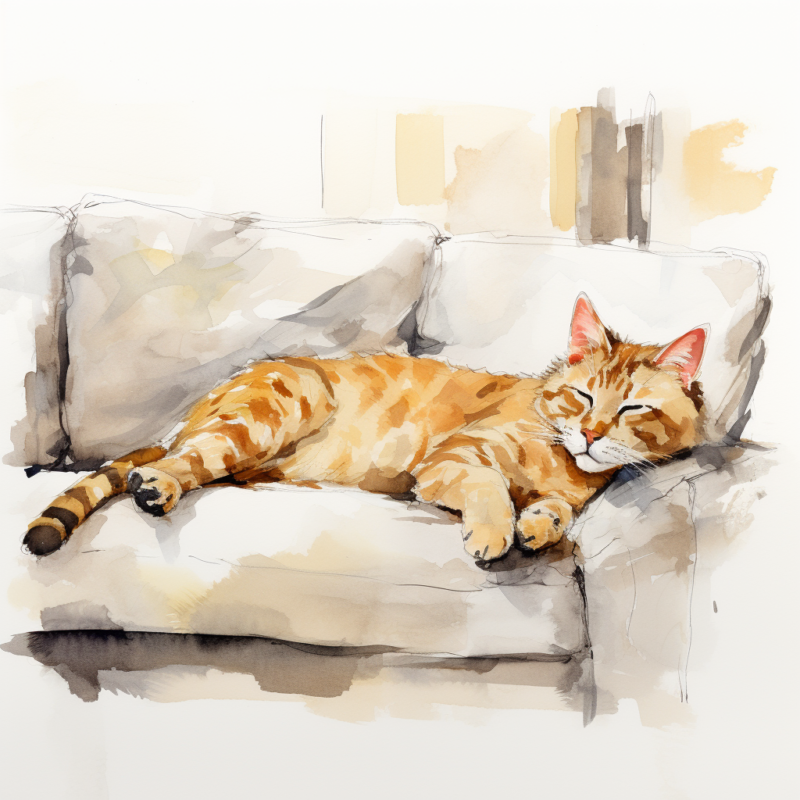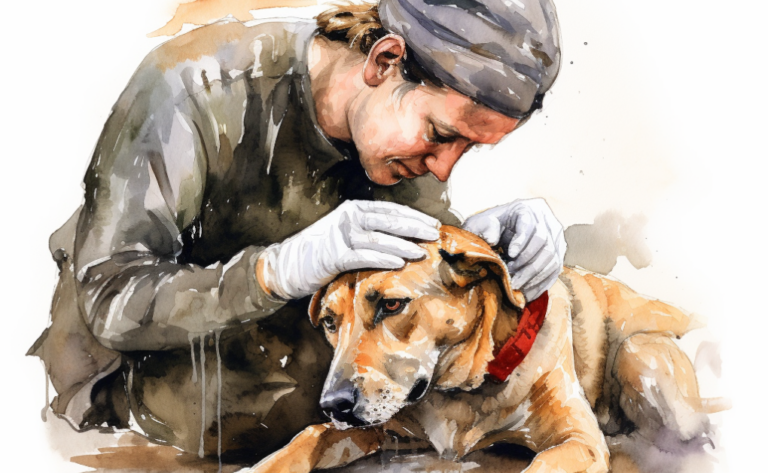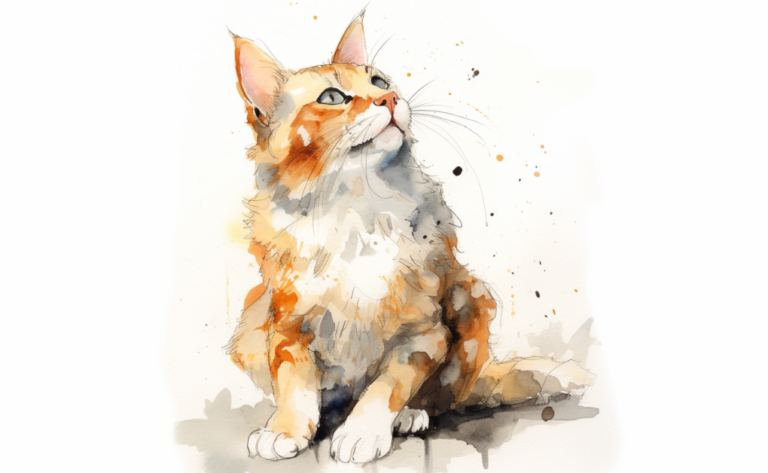What are Gastrointestinal Parasites in Cats?
What is it?
How is it Treated?
Breed Predispositions
Gastrointestinal parasites can occur in cats of any breed or age and can be more common in cats frequently exposed to contaminated environments or other animals.
Introduction
When Luna, a loving British Shorthair, suddenly started losing weight and experiencing diarrhea, her owner, Rachel, grew increasingly concerned. Seeking answers, she took Luna to the veterinarian for a thorough evaluation. After running a series of tests, the vet discovered that Luna was suffering from gastrointestinal parasites, a common issue that can affect cats of all ages and breeds.
Gastrointestinal parasites in cats are minuscule creatures that reside within their small intestine. These parasites do not pose a risk to humans but can instigate cat health issues. They are notably widespread in the feline population, particularly in kittens, who tend to consume more food about their body weight than adult cats.
Cats can contract these intestinal worms when they consume food or water tainted with the parasite’s eggs, or in some cases, through eating infected rodents. The parasite Toxocara cati (T. cati) is commonly found in cats and is known to cause toxocariasis. This parasite, which can live in the small intestine, is zoonotic, meaning humans can also become infected through contact with contaminated cat feces.
While toxocariasis typically manifests as a mild infection and doesn’t require treatment, in some instances, it can lead to serious complications. These may include severe conditions such as blindness and seizures. Moreover, certain gastrointestinal parasites can cause anemia or even lead to intestinal blockage, which can be life-threatening. Other parasites, such as the giardia infection, are also a potential concern for cats and their owners. Consequently, awareness of parasitism and its prevention is vital for the health of cats and their human companions.
Types of Gastrointestinal Parasites in Cats
Cats are prone to many types of gastrointestinal parasite species. Here are some examples of parasites that may infect cats
Roundworms
Roundworms, scientifically known as Ascarids, are intestinal parasites common in cats. They have a spaghetti-like appearance and can measure up to seven inches. Roundworms live primarily in a cat’s intestines but can migrate to other organs in severe cases.
Cats can contract roundworms by ingesting contaminated soil or feces, consuming an infected rodent, or in utero transfer from a mother cat to her unborn kittens. Roundworm eggs are resilient and can survive in the environment for years, creating a high risk of infection.
In mild cases, cats may show no symptoms of a roundworm infestation. However, when the infestation is significant, symptoms can include a potbelly appearance, weight loss, dull coat, diarrhea, vomiting, or constipation. A severe infestation could lead to intestinal blockage, a serious condition that requires immediate medical intervention.
Roundworms are usually treated with oral or injected deworming medications administered by a vet. These medications kill the adult roundworms but not the eggs, so multiple treatments spaced a few weeks apart are typically necessary to fully eliminate the infestation.
Hookworms
Hookworms are small, thin worms that attach to the cat’s intestinal wall. Unlike roundworms, they are blood-feeding parasites, meaning they latch onto the intestinal lining and feed on the cat’s blood, leading to potential anemia.
Hookworms are generally contracted through contact with contaminated soil. The larvae penetrate the cat’s skin and then migrate to the intestine. Cats can also ingest hookworm larvae directly or become infected by eating an infected rodent.
Symptoms of hookworm infection can include anemia, which can lead to weakness and pale gums, as well as weight loss, bloody diarrhea, and general lethargy. In severe cases, hookworms can cause significant blood loss leading to life-threatening anemia.
Treating hookworms involves oral or injectable deworming medications. Due to the potential blood loss, iron supplements or even blood transfusions may be necessary in severe cases.
Tapeworms
Tapeworms are long, flat worms that attach to a cat’s intestines. Segments containing tapeworm eggs break off and pass through the cat’s digestive system, appearing in the cat’s feces.
Cats typically become infected with tapeworms by ingesting an intermediate host, like an infected flea or rodent. Once inside the cat’s body, the tapeworm hatches and attaches to the intestinal lining.
An infected cat may show signs of weight loss, increased appetite, and digestive upset. You might notice rice-like segments in your cat’s feces or around its anus, which are the broken-off segments of the tapeworm.
Tapeworms are treated with oral or injectable deworming medications that target the adult worm. Treatment is usually effective, and the tapeworms are eliminated within a few weeks.
Giardia
Unlike the other parasites mentioned, Giardia is a single-celled parasite in the intestinal tract. It is one of the most common intestinal parasites in cats.
Cats can contract Giardia by ingesting the cyst stage of the parasite, which may be present in contaminated water, food, or surfaces or through contact with infected feces.
Common symptoms of Giardia infection include diarrhea, dehydration, weight loss, and vomiting. The stool may be foul-smelling and greasy in appearance.

Giardia is typically treated with specific antiprotozoal medication. As Giardia can be tough to eliminate and can be passed to humans, strict hygiene measures should be enforced during treatment.
Coccidia
Coccidia are microscopic, single-celled organisms living in cats’ intestinal walls. They reproduce in the intestinal cells and can cause inflammation and damage to the tissue.
Cats become infected with coccidia through ingestion of contaminated feces or soil. The disease is most common in kittens under six months old, as their immune systems are not fully developed and may not yet have developed immunity to the parasite. Coccidia can also thrive in crowded, stressful conditions, such as those found in some breeding or shelter situations.
Signs of coccidia infection can vary. Some cats may show no signs at all, while others can have severe, watery diarrhea, loss of appetite, and weight loss. Severe infections, especially in kittens, can be fatal.
The primary drug used to treat coccidia infection is a sulfa-type antibiotic, which stops the parasite from reproducing, thus allowing the cat’s immune system to eliminate the infection. Additionally, maintaining a clean environment is crucial to prevent reinfection.
Toxoplasma
Toxoplasma gondii is a parasite that can infect most mammals and birds, but its definitive host — where it undergoes sexual reproduction — is the cat.
Cats typically contract T. gondii by consuming the raw or undercooked flesh of other animals infected with the parasite. They can also become infected by ingesting oocysts (the infective form of the parasite) from soil or anything contaminated with cat feces.
Although many cats can be infected with T. gondii and show no symptoms, others may exhibit signs of infection, such as loss of appetite, fever, lethargy, and respiratory or neurological problems in severe cases.
Cats with toxoplasmosis are treated with antibiotics, usually for at least three weeks. In severe cases, hospitalization and additional supportive care may be required.
Lungworms
As the name suggests, lungworms are parasites that live in cats’ lungs. These worms are thin and thread-like and live in the airways.
Lungworms are usually contracted when a cat eats an infected host, such as a bird or a rodent. In some cases, cats can also become infected by swallowing lungworm larvae in the environment.
Lungworm infections can cause a dry, chronic cough, wheezing, and respiratory distress. Some cats may also show signs of weight loss and general ill health.
Treatment usually involves an antiparasitic medication, often administered multiple times over a few weeks. Additional supportive care, such as oxygen therapy, may sometimes be required. Following the vet’s instructions closely is essential, as improper or incomplete treatment can lead to reinfestation or complications.
Diagnosis of Feline Gastrointestinal Parasites
Identifying gastrointestinal parasites in cats entails physical examination, historical data collection, and lab testing. The exact process might vary depending on the suspected common intestinal parasite.
Fecal Flotation Analysis
The fecal flotation test is a frequent method for diagnosing various types of gastrointestinal parasites, such as roundworms, hookworms, whipworms, and some forms of coccidia. This involves blending a small quantity of the cat’s stool with a special solution that causes parasite eggs to float. A cover slip is placed atop the container, and after a while, it’s taken off and examined under a microscope to identify the presence of parasite eggs.

Fecal Smear Test
A fecal smear test involves smearing a tiny amount of the cat’s feces onto a microscope slide and observing it under a microscope. This technique can detect certain parasites like Giardia and larvae of lungworms.
Baermann Technique
The Baermann test is a specific technique used to spot the larvae of lungworms. It requires putting a sample of the cat’s stool in warm water and leaving it for a period. The larvae, if present, will migrate out of the feces and settle at the bottom of the container, where they can be gathered and identified under a microscope.
Direct Observation
In certain cases, parasites may be directly observed during a physical examination. For instance, tapeworm segments can occasionally be spotted in a cat’s feces or around its anus. Moreover, a vet may be able to see adult roundworms in a cat’s vomit or feces, both of which indicate a roundworm infection.
Blood Testing
Blood tests can help diagnose certain types of external parasites, like heartworms, which can be detected through an antigen test. A complete blood count (CBC) can also hint at a parasitic infection, as it may indicate a high count of specific types of white blood cells that typically increase in response to parasites.
Each diagnostic method helps identify the presence of parasites or their eggs or larvae in the cat’s body. The precise method will be determined by the type of parasite suspected, the cat’s symptoms, and other factors. Consequently, it is how the infection is diagnosed, whether it’s a hookworm infection, roundworm infection, or another type of parasite that may live in the stomach or intestines.
Prevention of Gastrointestinal Parasites in Cats
Preventing intestinal parasites in cats involves a combination of good hygiene, regular veterinary care, and preventative treatments. Here are some key measures cat owners can take:
- Regular Vet Check-ups: Take your cat for regular veterinary check-ups, including routine fecal examinations. These can detect the presence of parasites before they cause serious health problems. The vet can also provide you with preventive treatments if necessary.
- Preventive Medications: Depending on your location and your cat’s lifestyle, your vet might recommend preventive treatments for certain parasites, such as heartworms or fleas, which can transmit other parasites.
- Good Hygiene: Clean the litter box daily to reduce the chances of parasites spreading. Use gloves when handling feces, and wash your hands thoroughly afterward.
- Proper Nutrition: A well-fed cat is generally healthier and more resistant to parasitic infections. Ensure your cat has a balanced diet that meets all their nutritional needs.
- Safe Outdoor Environment: If your cat goes outdoors, ensure the area is clean and free from feces that could harbor parasites. If possible, prevent your cat from hunting small animals like rodents or birds that could be infected with parasites.
- Flea Control: Regularly check for and treat fleas, as they can transmit tapeworms.
- Avoid Feeding Raw Food: Some parasites can be found in raw meat. If possible, avoid feeding raw food to your cat. If you feed raw, ensure the food has been frozen for at least 72 hours before feeding to kill potential parasites.
These measures can significantly reduce the risk of your cat getting infected with intestinal parasites.
Preventive Medications Needed After Treatment
Following successful treatment of intestinal parasites, veterinarians often recommend several preventive measures to stop re-infestation. Here are a few common preventive medications and treatments:
- Broad-Spectrum Dewormers: Medications such as praziquantel, pyrantel pamoate, and fenbendazole can help prevent parasitic infections, including roundworms, hookworms, and tapeworms. Depending on your cat’s risk level and the specific medication, these may be administered monthly, quarterly, or semi-annually.

- Heartworm Preventatives: These medications, like ivermectin (Heartgard), selamectin (Revolution), and milbemycin (Interceptor), are usually given monthly to prevent heartworm disease. Some of these medications also prevent certain types of intestinal parasites.
- Flea and Tick Preventatives: Topical treatments like fipronil (Frontline) or oral medications like nitenpyram (Capstar) can help to control fleas and ticks, which can transmit certain parasites.
- Prescription Diets: Specialized pet foods may be recommended to help maintain your cat’s health and lower the risk of future infestations. These diets often contain prebiotics and probiotics to support gut health.
How Often to Deworm a Cat After Treatment?
The frequency of deworming your cat after treatment can vary greatly depending on the cat’s lifestyle, age, and geographical location.
- Indoor-Only Cats: Indoor cats have less exposure to parasites, so they might only need to be dewormed once or twice a year after the initial treatment.
- Outdoor Cats: Cats that spend time outdoors have a higher risk of parasite exposure. These cats may need to be dewormed every three months or so.
- Kittens: Kittens are often dewormed more frequently in the first year of life, as they can be born with worms or easily pick them up. The American Association of Veterinary Parasitologists recommends deworming kittens every 2 to 3 weeks until they are three months old, then monthly until they are six months old.
- Cats in Multi-Pet Households: If you have multiple pets, particularly if some go outdoors, it might be wise to deworm all the animals in your household regularly to prevent reinfection.
Always consult with your vet to determine your cat’s best deworming schedule. They can provide guidance based on your cat’s specific risk factors. Routine fecal testing is also important, as it allows for early detection and treatment of new parasitic infections.
Frequently Asked Questions
Disclaimer: The information provided on this veterinary website is intended for general educational purposes only and should not be considered as a substitute for professional veterinary advice, diagnosis, or treatment. Always consult a licensed veterinarian for any concerns or questions regarding the health and well-being of your pet. This website does not claim to cover every possible situation or provide exhaustive knowledge on the subjects presented. The owners and contributors of this website are not responsible for any harm or loss that may result from the use or misuse of the information provided herein.







